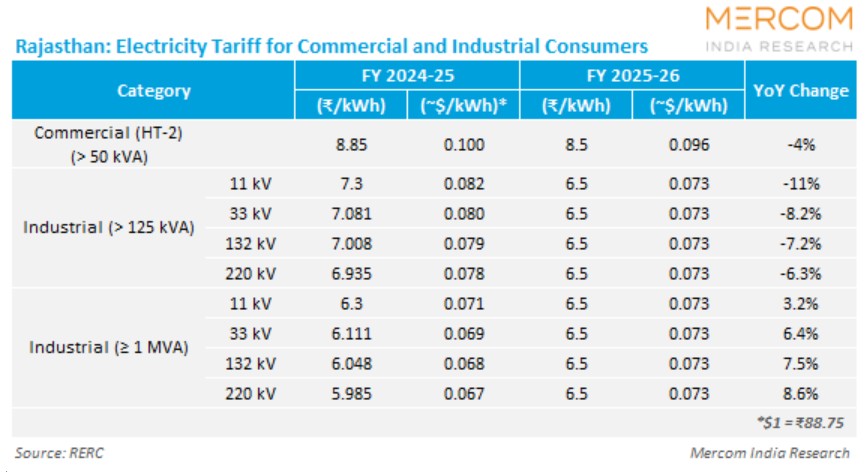Rajasthan Sets ₹6.50/kWh Base Tariff for Large Industries, Voltage Rebates Stay
The tariff for commercial and residential categories has been slashed
October 8, 2025
Follow Mercom India on WhatsApp for exclusive updates on clean energy news and insights
Rajasthan Electricity Regulatory Commission (RERC) has approved retail electricity tariffs for the financial year (FY) 2026.
For the commercial category with a monthly contract demand of over 50 kVA, the energy charge is reduced by 3.9% from ₹8.85 (~$0.099)/kVA to ₹8.5 (~$0.095)/kVA. The monthly fixed charge has been increased to ₹300 (~$3.38)/kVA from ₹320 (~$ 3.60)/kVA.
Industrial Category
Energy charges for large industrial consumers are benchmarked to 11 kV at ₹6.50 (~$0.073)/kWh. Consumers taking supply at higher voltages receive a 3% rebate on the energy charge at 33 kV, a 4% rebate at 132 kV, and a 5% rebate at 220 kV.
Large industrial categories with a monthly billing demand of at least 1 MVA and a load factor of at least 50% for the billing month must also pay energy charges of ₹6.50 (0.073)/kWh at 11 kV, with voltage rebates applicable.
The monthly fixed charge is increased to ₹380 (~$4.28)/kVA from ₹300 (~$3.38)/kVA.
Domestic Category
For the domestic category with a monthly consumption of up to 150 units, the tariff remains unchanged for the first 50 units. For consumption above 50 units and up to 150 units, the energy charge is reduced 7.6% from ₹6.50 (~$0.073)/kWh to ₹6 (~$0.068)/kWh. The monthly fixed charge is reduced to ₹150 (~$1.69)/connection from ₹250 (~$2.81)/connection.
For the domestic category with a monthly consumption of up to 300 units, the tariff for the first 150 units remains unchanged from the previous slab. For consumption above 150 units and up to 300 units, the energy charge is reduced by 4.7% from ₹7.35 (~$0.083)/kWh to ₹7 (~$0.079)/kWh. The monthly fixed charge remains ₹300 (~$3.38)/connection.
For the domestic category with a monthly consumption of up to 500 units, the tariff for the first 300 units remains unchanged from the previous slab. For consumption above 300 units and up to 500 units, the energy charge is reduced by 8.4% from ₹7.65 (~$0.086)/kWh to ₹7 (~$0.079)/kWh. The monthly fixed charge is increased to ₹500 (~$6.63)/connection from ₹400 (~$4.51)/connection.
For the domestic category with a monthly consumption of more than 500 units, the tariff for the first 500 units remains unchanged from the previous slab. For consumption above 500 units, the energy charge is reduced by 5.6% from ₹7.95 (~$0.090)/kWh to ₹7.50 (~$0.085)/kWh. The monthly fixed charge is increased to ₹800 (~$9)/connection from ₹450 (~$5.07)/connection.
For high-tension domestic consumers with a contract demand above 50 kVA, the energy charge is reduced by 9% from ₹7.15 (~$0.081)/kWh to ₹6.50 (~$0.073)/kWh. The monthly fixed charge is increased to ₹300 (~$3.38)/kVA of billing demand from ₹275 (~$3.09)/kVA of billing demand.
Other Tariffs
For FY 2026, wheeling charges are as follows: at 132 kV and above, the charge is ₹0.01 (~$0.000)/kWh; at 33 kV, the charge is ₹0.12 (~$0.001)/kWh; and at 11 kV, the charge is ₹0.62 (~$0.007)/kWh.
The cross-subsidy surcharge for open access consumers for FY 2026 is uniform across categories and voltage levels, at ₹1.58 (~$0.018)/kWh, applicable at 11 kV, 33 kV, and 132 kV and above.
An additional surcharge of ₹0.72 (~$0.008)/kWh is payable.
A green tariff premium of ₹0.05 (~$0.001)/kWh is levied over and above the applicable normal tariff.
Parallel operation charges will be levied on co-located captive power projects as follows:
- Conventional captive projects at ₹27.237 (~$0.307)/kVA per month of installed capacity
- Renewable captive projects at ₹11.90 (~$0.134)/kVA per month of installed capacity
- Hybrid captive projects will attract both rates in proportion to the conventional and renewable shares
Rooftop solar projects under net and gross metering are excluded from parallel operation charges. These charges will apply only to the power consumed by the on-site/co-located load. They will be applied to the net capacity, i.e., the total capacity minus the open access capacity, of the generators.
Parallel operation charges are levied on co-located projects, irrespective of their captive status, to the extent that capacity is utilized for the co-located load. No parallel operation charges will apply to capacity under the power purchase agreement entered into between power distribution companies and captive projects.
A regulatory surcharge of ₹0.70 (~$0.008)/kWh will apply to domestic consumers with monthly consumption of up to 100 units, and ₹1 (~$0.011)/kWh for all other domestic consumers (above 100 units) and other consumer categories.
This regulatory surcharge is a combination of fuel and power purchase adjustment surcharge to be levied as per Regulation 87 of the RERC Tariff Regulations, 2025.
Subscribe to Mercom’s real-time Regulatory Updates to ensure you don’t miss any critical updates from the renewable industry.

